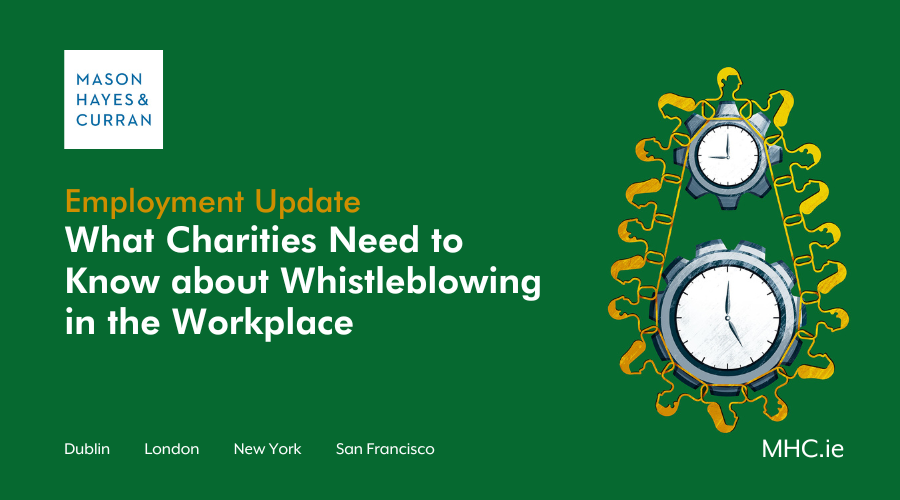What Charities Need to Know about Whistleblowing in the Workplace

Recent reports indicate that most whistleblowing incidents occur in the charity sector, where public trust is paramount. Charities must maintain high governance standards, which should include where required robust whistleblowing policies. Our Employment & Benefits team outlines the merits of ensuring compliance with the Protected Disclosures Acts and safeguarding your organisation’s reputation while protecting whistleblowers.
Transparency International Ireland reported in recent years that most incidents of whistleblowing occur in the charity sector. In circumstances where charities receive tax exemptions, public funds and donations, there is a high public expectation that charities will operate with integrity and the highest governance standards. This includes having robust systems in place whereby workers can raise protected disclosures, or “blow the whistle,” and to protect them where they do.
1. What is a protected disclosure?
Under the Protected Disclosures Acts 2014 – 2022 (the PDA), a protected disclosure is a disclosure by a worker. It involves information that has come to their attention in a work-related context. The worker must reasonably believe that the information tends to show one or more "relevant wrongdoings", as defined under the PDA. The disclosure must be made to the employer or otherwise in accordance with the PDA. A “relevant wrongdoing” includes, but is not limited to:
- Criminal offences
- A breach of a legal obligation, other than one arising under the worker’s employment contract, and
- The endangerment of an individual’s health and safety or damage to the environment
In the charity sector, we frequently see workers raising protected disclosures regarding governance failures, financial irregularities, safeguarding issues and ethical concerns.
2. Who can make a protected disclosure to a charity?
Of particular significance to charities is the fact that “worker” is broadly defined in the PDA. The definition includes:
- Employees
- Consultants
- Agency workers
- Shareholders
- Job candidates
- Board members
- Volunteers
- Unpaid trainees
- People on work experience, and
- Certain other non-employees
According to the 2022 census, 711,379 people (14% of the population) engage in some form of unpaid work in charitable or voluntary organisations. These individuals potentially fall within the scope of the PDA.
3. Are charities required to implement whistleblowing policies?
Private sector organisations with over 50 employees and all public sector organisations, including those with charitable status, must implement internal reporting channels or whistleblowing policies for workers to raise protected disclosures in accordance with the PDA. However, it is best practice for all charities to have comprehensive whistleblowing policies in place, particularly given the regulatory constraint and scrutiny within which charities operate. The Charities Regulator’s Governance Code specifically states that charities must be “accountable and transparent”. In addition, the Code requires charities to put in place procedures for dealing with “queries, comments and complaints”.
4. What process must be followed upon receipt of a protected disclosure?
The PDA sets out a prescribed process organisations must adhere to. In summary, reports must be acknowledged with seven days of receipt. Feedback must be provided to the reporting person within a reasonable period, not more than three months from the date of the acknowledgement of receipt of the report. Upon written request from the reporting person, further feedback must be provided at intervals of three months until the procedure is closed. There is no obligation to accept or follow up on anonymous reports, but a charity may choose to do so.
5. Can disclosures be made externally to the Charities Regulator?
Workers can report relevant wrongdoings externally to “prescribed persons” with regulatory functions in certain areas. One such prescribed person is the Chief Executive of the Charities Regulator, who is responsible for dealing with external reports regarding the regulation of charities in accordance with the Charities Act 2009. However, for such a disclosure to attract protection under the PDA, the worker must reasonably believe that the information disclosed, and any allegations contained in the disclosure, are substantially true.
6. What protections exist for workers who raise protected disclosures?
Compensation awards of up to five years’ remuneration can be made by the Workplace Relations Commission (WRC) where a worker is penalised for making a protected disclosure. Where a worker is not in receipt of remuneration, for example, a job applicant or volunteer, the WRC can make an award of up to €15,000 to these individuals.
7. Could a charity face criminal liability for non-compliance with the PDA?
The PDA creates various offences, such as:
- Breaching the duty to maintain the confidentiality of a reporting person
- Failing to maintain and operate internal reporting procedures
- Hindering a person from making a report
- Bringing vexatious proceedings
- Making a report containing information the reporting person knows to be false, and/or
- Penalising a person for making a report
A person who commits an offence is liable:
- On summary conviction, to a class A fine, that is a fine not exceeding €5,000, or to imprisonment for a term not exceeding 12 months, or both, or
- On conviction on indictment, to a fine not exceeding €75,000, €100,000 or €250,000, depending on the offence, or to imprisonment for a term not exceeding two years, or both
8. How has the WRC dealt with charitable organisations who have penalised workers for raising protected disclosures?
An organisation’s charitable status will not deter the WRC from making substantial awards of compensation to any worker who has been penalised by the charity.
For example, the WRC recently awarded €75,000 to a financial controller employed by a community-based education charity who was “targeted, sidelined and penalised” for making protected disclosures. These disclosures related to “governance and procurement issues, managerial decisions, and…the disbursement of public and charitable funds” which the worker alleged constituted “undue profligacy”.
After raising her disclosures, the worker suffered a “litany of acts” by the CEO and “to a lesser extent by the Board”, including:
- Failure to allow her to apply for pay restoration
- Failure to align her pay to a HSE salary scale, the charity was HSE-funded
- Removal of some of her duties
- Sidelining her role, and
- Ultimately, making her role redundant
However, it is important to note that the WRC determined that the redundancy did not amount to penalisation as it was “a genuine redundancy situation” due to a “substantial cut in funding”.
The WRC acknowledged that charities operate in a "highly regulated sphere" and must follow employment, charity, and company laws. However, it agreed with the worker's claim that she had become "a bother to the organisation," which led to her being penalised.
This case demonstrates how failure to handle complaints sensitively can be costly for charities, both reputationally and financially.
9. Are there any other tips for dealing with protected disclosures?
All managers and staff likely to receive protected disclosures should receive basic training to raise awareness around whistleblowing. Protected disclosures are not always clearly labelled as such, and staff must be able to identify potential protected disclosures in order to deal with them appropriately.
For more information and expert advice on protected disclosures, please contact a member of our Employment & Benefits team.
The content of this article is provided for information purposes only and does not constitute legal or other advice.
Share this:



